- Home
- Jim Kjelgaard
We Were There at the Oklahoma Land Run Page 9
We Were There at the Oklahoma Land Run Read online
Page 9
CHAPTER NINE
_The Claims_
The sun was still high when Cindy, her father, and Pete Brent reachedthe claims Pete had in mind. True to the promise of early morning, theday had become hot. Walking their horses, they stopped on a grassyknoll.
"There they are!" Pete said proudly, "and we're first!"
Cindy gasped with pleasure, for the land to which Pete had led them wassurely the most beautiful in the world. It was level, surrounded byknolls and hillocks much like the one upon which they stood, and grassthat would be shoulder-high to a horse was already almost knee-high. Awide stream curled through it, and there was a fine grove of oak treesin new leaf.
"It looks great!" Mr. Simpson exclaimed.
Her father's voice had a spirit and glow that Cindy had never noticedbefore, but she knew why it was there. A true farmer, Jed Simpson knewfine land when he saw it.
"It's the greatest!" Pete said. "And the market will be ready when ourcrops are." He pointed. "Two miles over there, half a section, or threehundred and twenty acres, have been reserved for a town site. They'regoing to call it Plains City. Two miles over there," he pointed in adifferent direction, "is the railroad. The oak grove will be half onyour claim and half on mine."
"Well," Mr. Simpson grinned, "let's go down and stake."
They rode down the knoll, and the men took their coats off. Cindyremoved her jacket, for she was perspiring, and dropped it in thegrass.
"Don't forget where it is," her father warned.
"I won't, Dad," Cindy promised.
They rode until Pete halted them.
"Stick your flag in right here, Jed," he told Cindy's father.
"Here?" Mr. Simpson questioned.
"This is it."
Mr. Simpson dismounted, and holding the tired Sunshine's reins, he tookthe flag from his saddle and rammed the pointed end of the stick intothe ground.
"I christen thee Simpsonia," he said solemnly.
"Good enough." Pete couldn't lose his grin. "Now I'll stake."
In spite of the long run, Pete's pony still had enough spirit to canter.Pete rode him through the oak grove and thrust his flag into the centerof the claim he wanted. Cindy dismounted and petted Sparkle. She hadthought that claiming the homesteads would be the most exciting part ofall, but she was just as happy that it wasn't. There'd been enoughexcitement for one day.
Still grinning broadly, Pete came riding back.
"It's our land now," he said. "Let's care for the horses, and I'll showyou where the corners are."
They rode to the oak grove, stripped their mounts, rubbed them down,and Pete and Jed staked their horses on picket ropes. Cindy had no rope,but Sparkle showed no wish to leave his friends, and all three horsesstarted happily to crop the rich grass.
"Now I'll show you--" Pete began.
"Hey!" Cindy shouted.
They had left the sacks of food with their other gear. Cindy lookedaround just in time to see a little black bear with a sack of food inhis mouth running through the oak grove and into the tall grass. Jeddrew his revolver, but before he could shoot the little bear haddisappeared. Jed sheathed his gun.
"Doggone! There goes half our grub!" he exclaimed.
"And with three of us to eat what's left," Pete mourned, "we're likelyto be on short rations. I'd better take care of the other sack."
He returned to the grove, pulled down a supple oak branch, tied theremaining sack to it, and let the branch spring upward. Coming back,Pete shrugged. The lost food was a serious matter, but there was no usecomplaining.
"Our claims adjoin down by the creek," Pete said, "and each of us hasenough creek frontage so that we'll never lack for water. Come on."
He led them to the creek and showed them a neat cairn, or pile, of rocksthat the government surveyors had placed there. Some of the rocks hadtumbled down, but they were quickly replaced and the cairn built higher.Cindy looked at the creek.
The water had eaten into the opposite bank to form a pool about ten feetlong, six feet wide and twenty inches deep. But the entrance was no morethan about two feet wide by eight inches deep. Lurking in the center ofthe pool were at least fifteen big fish that had swum out of the creekto hunt minnows.
"Your next corner," said Pete, "is down here."
He led them to another pile of rocks, and they built that up. Then hetook them to the rest of the boundary markers that defined these claims.They were so busy building up the cairns that Cindy was astonished tofind themselves surrounded.
There had been no one else in sight when they arrived. Now, whereverCindy looked, she saw picketed horses or mules and busy men. The whitetops of two covered wagons glowed in the descending sun. At least two ofthose who had put their faith in wagons had made it this far.
Mr. Simpson, who had been carrying a big boulder to the last corner,added it to the cairn and straightened. He looked around.
_Mr. Simpson added a big boulder to the cairn_]
"Seems as though we have neighbors, Pete," he remarked.
"It was bound to be," Pete said. "This is some of the best land inOklahoma, and we Boomers have known of it for a long while. Bet most ofthe people around us are Boomers."
"What do we do now?" Jed asked.
Pete, still grinning, yawned. "Let's make camp."
They went back to the oak grove. Jed broke brittle branches from a treethat had fallen and died, and Pete built a fire. He opened the sack offood, cut strips of bacon, and inserted a stick of green wood into thehollow handle of a frying pan. The wood lengthened the handle, so thatPete was able to hold the frying pan over the fire without burning hishand. He cooked the bacon, and when it was done he laid all the slicesat one side of the frying pan and scooped a generous portion ofalready-cooked beans in beside them. Mr. Simpson brought three slabs ofclean bark, and Pete divided the food into three equal portions.
They were hungry, for they had worked hard, and since there were nospoons or forks they had to eat with their fingers. It was, Cindythought, a delightful way to dine, and she had never known that bacon,warmed-over beans, and stale biscuits could taste so good. After she'deaten her portion she was still hungry, but she purposely avoidedlooking at the nearly empty sack. The food had been intended for oneperson, not three, and there was just enough left for a skimpybreakfast.
"I'm full," said Mr. Simpson, throwing his slab of bark into the fire.
"I am, too," Pete said. "How about, you, Cindy?"
"Um-um-yummy." Cindy did not want to tell a lie.
The grazing horses raised their heads and stared hard toward somethingwhich only they knew was coming. Pete and Jed got to their feet, andtheir hands hovered very near their holstered guns. A moment later twohorsemen appeared on top of a hillock and started toward them. Petegrinned reassuringly. "It's all right. I know them. They're Cal and SimMacklin."
The horsemen came near, and one of the riders shouted, "Hi! You oldBoomer!"
"Who are you calling 'Boomer'?" Pete shouted back. "And who 'boomed'any harder than you two?"
"Can we have some wood for a fire?"
"Sure thing," Pete said. "These are Jed and Cindy Simpson. They're withme."
"Glad to know you," Sim Macklin said cordially, and Cal added hisgreeting.
The two men cared for their horses and came into the oak grove. Cindyliked them immediately, for they seemed to be a special kind of men.They were quiet, but they were self-assured and gave the impression thatthey could take care of themselves anywhere.
"Had anything to eat?" Pete asked.
Cal Macklin grinned. "We sort of came away without a grubstake."
"I'll fix you something right away."
Pete started cooking the rest of the bacon and beans, took the remainingbiscuits from the sack, and Cindy groaned inwardly. They'd have nobreakfast at all now, but they couldn't deny hungry people.
"Get your claims?" Pete asked.
"I got one next section over," said Cal. "Sim's looking for a town lot."
Cal took a little coil
of wire from his pocket, bent an end that hadbeen sticking him, and put the coil back.
"How are things in Plains City?" asked Pete.
"Wild," said Sim. "Six claimers for every lot. They've staked thestreets and everything else. I'll wait until it quiets down and buy me alot. Meanwhile I'm hanging out with Cal. I'm going back for his wagontomorrow."
"Would you mind," Mr. Simpson spoke up, "stopping by our wagon andasking my son to come up too?"
"I'll be glad to. Where's your wagon?"
"Right next to mine," said Pete, "on the border a half mile north ofSycamore Crossing."
"I'll find it," Sim promised. "Anything special you want?"
"You can tell Alec to bring the tools, and I'd like an extra team ofmules. Tell my wife that Cindy's safe and we can use some food."
"Sure," said Sim.
Before dark, five more Boomers had come to the grove. Three of them hadnothing to eat, but the other two divided their food. Every claim, theysaid, was staked. Oklahoma had been almost settled in half a day. Therewas no doubt that Sooners had much choice land, and there were manyarguments and claim jumping. Because they had known exactly where to go,the Boomers had many of the finest homesteads.
The Boomers were still, Cindy felt, a special breed. It was hard toimagine them jumping any claims, but just as hard to imagine anyonejumping theirs. Cindy yawned.
"Tired, honey?" her father asked.
"Sort of."
"Guess we could all use some sleep."
Cindy slept with her head on Sparkle's saddle and the saddle blanketover her. She did not awaken until the sun was rising. The Boomers who'dcamped with them had already gone their separate ways, but Jed and Petestill slept. Lacking tools, they could do no work. But if they lefttheir claims, somebody might jump them.
Going to the creek, Cindy drank as much water as she could hold and toldherself she wasn't hungry. Rising, she saw a wagon coming over ahillock. It contained the family who had to "make out" in Oklahoma.
Pete and Jed joined Cindy, and the wagon drew to a stop beside them. Theman and woman were on the seat, and the woman looked very worried. Theman seemed more tired than ever, and evidently the children were asleepin the wagon.
"Howdy," the man said.
"Hi," said Jed and Pete together.
"How far," the man asked, "do you have to go into Oklyhomy to find landthat ain't staked?"
"I'm afraid," said Pete, "that you're too late."
"You mean," and the man seemed to grow more tired and the woman moreworried with each passing second, "it's all took up?"
"I'm afraid it is."
"I started good," the man said hoarsely, "but a horse played out. TimeI'd rested him, it was midnight. I started right out again."
"I'm sorry," said Pete.
"This your claim?" the man asked Jed.
"That's right."
"And that one's yours?"
"Yes, it is," said Pete.
"Whose is that'n over yonder?"
Cindy, her father, and Pete Brent looked at each other. There werehomesteaders on every claim except the one where a youngster had thrownher jacket down. Boomers had honored this sign of ownership.
"That's yours!" Cindy cried. "Go stake it!"

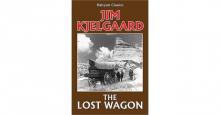 The Lost Wagon
The Lost Wagon The Spell of the White Sturgeon
The Spell of the White Sturgeon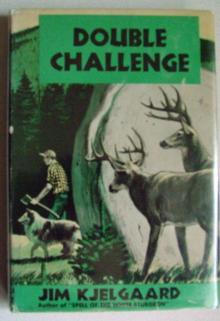 Double Challenge
Double Challenge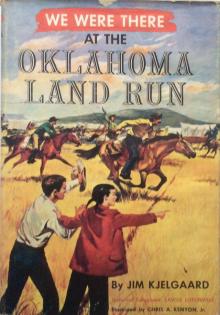 We Were There at the Oklahoma Land Run
We Were There at the Oklahoma Land Run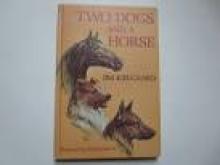 Two Dogs and a Horse
Two Dogs and a Horse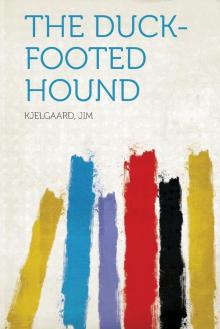 The Duck-footed Hound
The Duck-footed Hound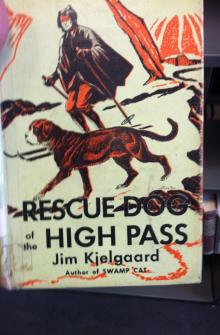 Rescue Dog of the High Pass
Rescue Dog of the High Pass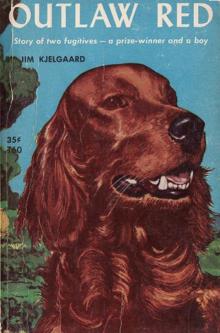 Outlaw Red
Outlaw Red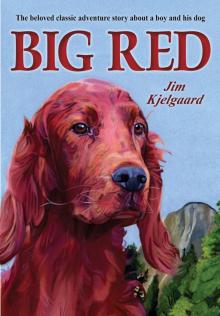 Big Red
Big Red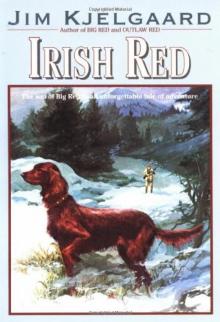 Irish Red
Irish Red